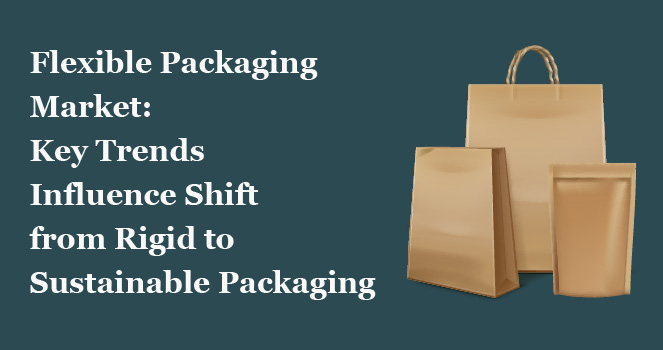



08, July 2022

During a product’s lifecycle, packaging emerges as a vital step in enhancing the durability and appearance of goods. In recent years, consumers’ interaction with packaged products has evolved significantly, resulting in high demand for convenient packaging solutions. Moreover, rising environmental concerns and ecommerce growth have influenced prominent brands to opt for flexible packaging to gain a competitive edge.
Flexible packaging materials have shown significant prominence over rigid packaging as they require less transportation and storage space, resulting in reduced resource wastage, energy consumption, and CO2 emissions. For instance, flexible plastics enable more than 78% weight savings than rigid solutions. This has led companies to opt for flexible solutions to reduce their carbon footprint. For example, Mondi Group partnered with Henkel to launch a fully recyclable mono-material refill pouch for Pril dish wash liquid.
As per Triton’s estimates, the global flexible packaging market is expected to witness substantial growth in terms of revenue and volume at a CAGR of 4.66% and 4.01%, respectively, over the forecast period 2022-2028.
Globally, the improvements in consumer goods manufacturing have influenced packaging manufacturers to develop innovative packaging solutions to ensure a higher shelf life of products. Since flexible packaging is easy to use and lightweight, it has become integral across F&B, cosmetic, and pharmaceutical sectors in major regions, including the Asia-Pacific and Europe.
The region’s market is expected to grow significantly during the forecast period, owing to a rise in private investments, low-cost labor, and higher domestic demand. This has led various market players to establish their operations in the region to gain a higher market share. For instance, Rengo Co Ltd opened the Yashio Second Logistics Center in the Kanto region, Japan, to expand the capabilities of its first logistics center.
Additionally, the rising demand for food and pharmaceutical products is anticipated to augment the consumption of flexible packaging solutions. The food & beverage category dominates in the application segment. An increase in population and food expenditure, especially in China and India, are key growth drivers of vacuum packaging. Our estimates thus indicate that a surge in packaged food products’ demand and rising R&D will propel the Asia-Pacific flexible packaging market on a growth path.
Given the declining growth of the pharmaceutical industry on account of shifting manufacturing bases to low-cost regions has negatively impacted the market. Nevertheless, the Europe flexible packaging market is expected to witness lucrative growth over the forecast period, owing to a rise in R&D expenditure in the pharmaceutical sector.
In the pharmaceutical sector, significant R&D investments have fueled the adoption of flexible packaging solutions to ensure chemical resistance and enable dispensing with precision. Flat pouches, gusseted bags, and wicketed bags have emerged as prominent flexible packaging types in the industry. For instance, pouch solutions reduce the need for a heat seal and offer tear notches and ergonomic handles, extending shelf life and decreasing product wastage.
Additionally, product differentiation has become a major trend as consumers opt for single-serve options. Our estimates indicate that the demand for flexible solutions in eastern European countries is expected to soar, owing to changing consumer preferences and rising income.
The flexible packaging market is moderately consolidated, with product differentiation increasing competition. In this regard, the development of application-specific products and technological innovations have compelled market players to expand their footings through acquisitions, product launches, and partnerships. Some of the notable strategies undertaken by players include:
In March 2022, Rengo Co Ltd acquired 100% shares of Nagai Tekko Co Ltd, making Nagai a Rengo subsidiary.
In April 2022, Mondi Group collaborated with Thimonnier, a French machine supplier, to develop recyclable packaging solutions to reduce plastic waste.
Sealed Air Corporation announced expanding and doubling its equipment manufacturing capacity in the next three years in May 2022.
The rapid surge in e-commerce sales, especially during COVID-19, fuelled the demand for safe and efficient flexible packaging. In some cases, products marketed in a retail environment do not have the same demand when sold online. Hence, manufacturers and retailers opt for distinct packaging formats to ensure a seamless consumer experience and maintain brand reputation via e-commerce platforms. Therefore, the expansion of the e-commerce industry is expected to create numerous opportunities for flexible packaging players over the upcoming years.

Prevalent cases of terrorist attacks in today’s world is increasing the need for severe standards of security for public safety, and the global market for biometric technology scrupulously accommoda..
Prevalent cases of terrorist attacks in today’s world is increasing the need for..